Enhance your academic research with AI tools, a proactive approach to personalized learning. In today’s streamlined research and learning landscape, AI fosters accessibility for students and scholars. Explore outstanding AI tools simplifying research tasks, navigating the vast sea of available information, and dedicating extensive hours to academic improvement. Dive into unparalleled research excellence with our curated collection of the Best 7 Research AI Tools. Let’s first explore these invaluable aids.
What Are Research AI Tools? 🤔
Tailored for researchers, AI tools streamline tasks like data analysis, literature review, and experiment design. Harnessing advanced machine learning and natural language processing, these tools automate time-consuming processes, accelerating research, extracting insights from extensive data, and empowering informed decision-making.
>> Don’t Miss: 6 Best AI Tools for Productivity to Help You Work Smarter (2024)
Best Research AI Tools of 2024 🏆
Dive into how these AI tools gather information and elevate your subject knowledge. Let’s explore further.
Typeset.io
Typeset.io proves highly beneficial for collaborative research endeavors, enabling multiple individuals to collaborate on a shared document concurrently. The integrated database compiles information from various journals, including their specific requirements, facilitating the identification of appropriate publishing outlets. Additionally, Typeset.io incorporates a plagiarism detection feature and a writing AI tool, enhancing the overall quality of your manuscript.
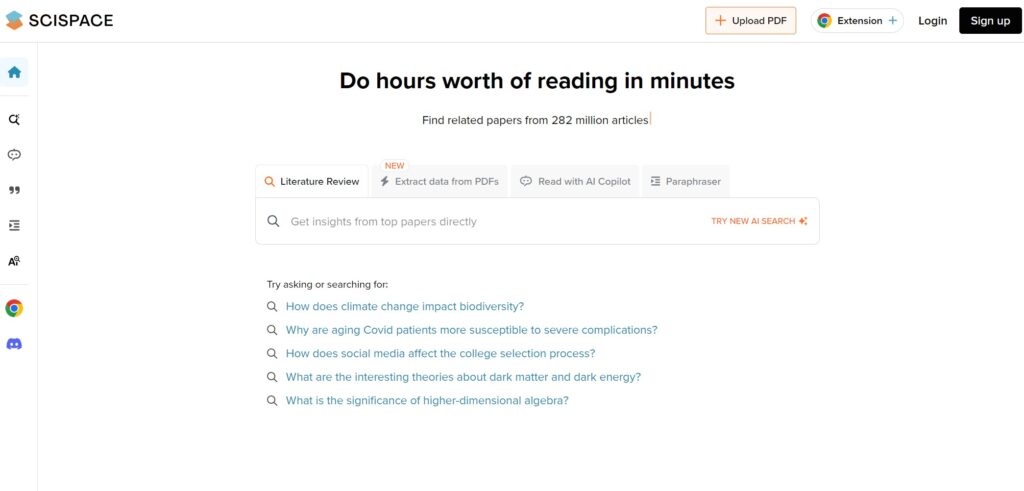
💻 Key Features:
- Predefined formatting templates.
- Citation and reference management.
- Simultaneous collaboration and version control.
- Journal selection and recommendations.
- Writing assistance and plagiarism check.
👍 Pros:
- Increased workflow efficiency.
- Seamless DOI assignment.
- Reduced publication costs.
- Directly export to Word or PDF.
👎 Cons:
- The software becomes cluttered as the document size increases.
- The conversion to a Word document is not easy.
💰 Pricing:
- Basic plan: Free.
- Premium plan: $9.99 per month.
- Teams and Labs plan: $5.49 per user, per month.
Quillbot
Quillbot is equipped with features tailored for enhancing writing and language skills, particularly catering to the needs of academic researchers. Built on sophisticated algorithms, Quillbot excels in paraphrasing to prevent plagiarism, suggesting vocabulary enhancements, and providing alternatives for word choices.
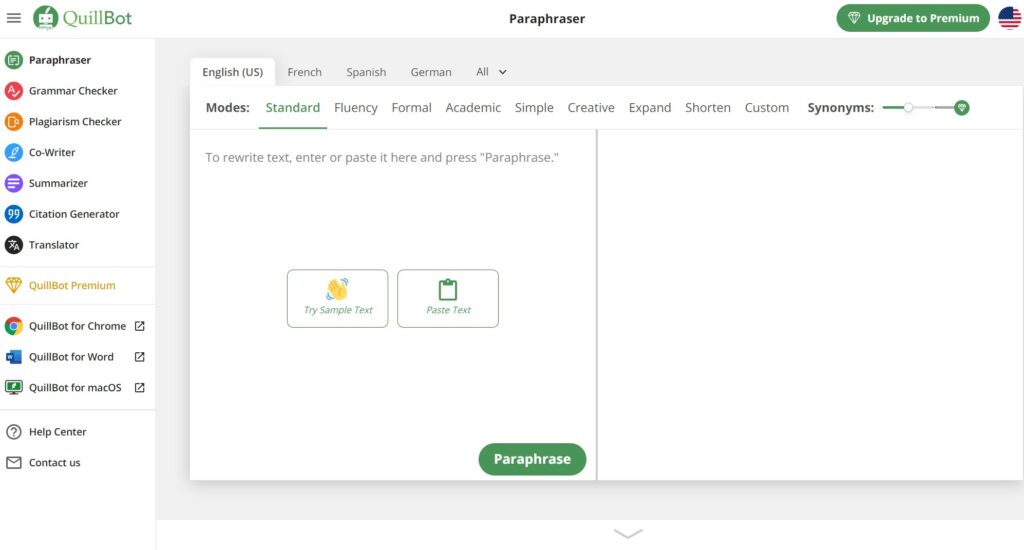
💻 Key Features:
- Translation assistance.
- Learning and language support.
- Research idea generation.
- Ensures accuracy in academic terminology and citation styles.
- Paraphrasing, summarizing, language enhancement.
👍 Pros:
- No signup is necessary for the free plan.
- Budget-friendly upon upgrading.
- A refund policy is in place.
- User-friendly with an intuitive interface.
- Access the Free Content Summarizer app.
- Utilize the Free Grammar Checker app.
👎 Cons:
- No AI content detection feature.
- It has only two writing modes available.
💰 Pricing:
- Free plan: Free.
- Premium plan: $9.95 per month.
OpenRead
OpenRead is a cutting-edge interactive platform powered by artificial intelligence, designed to facilitate the organization, engagement, and analysis of diverse literary forms, encompassing essays, journals, and research materials. The platform incorporates various features, including a responsive Q&A system addressing inquiries about articles. Notably, it introduces the Paper Espresso function, expediting the literature review process for researchers by efficiently digesting publications.
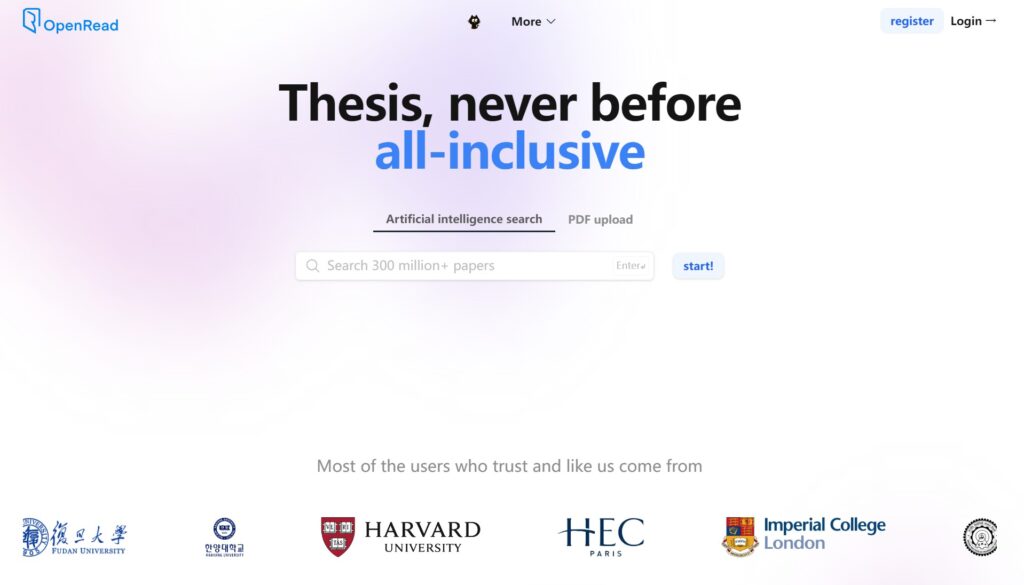
💻 Key Features:
- Interactive papers enhanced by AI.
- Q&A feature for papers.
- Paper Espresso, an NLP assistant.
- Extraction of interactive elements.
- Robust note-taking system.
- Comprehensive and focused reading modes.
👍 Pros:
- It provides interactive papers powered by AI.
- The platform is dedicated to fostering open access and cultivating open-mindedness within the research community.
- Users can access a diverse library of books, create personalized reading plans, and engage in interactive exercises to enhance their reading skills.
👎 Cons:
- It might not encompass all desired topics or disciplines.
- It is currently in the developmental phase, so the available content and features may be limited.
- Accessing the interactive papers and exercises may necessitate a high-speed internet connection and a compatible device.
💰 Pricing:
- Free plan: Free.
- Basic plan: $5 per month.
- Premium plan: $20 per month.
Scholarcy
Scholarcy serves as your digital companion designed to read and condense articles, reports, and book chapters. This aids you in staying abreast of the latest research developments and swiftly evaluating the relevance of any document to your work. Scholarcy identifies pivotal information and organizes data into pertinent categories.
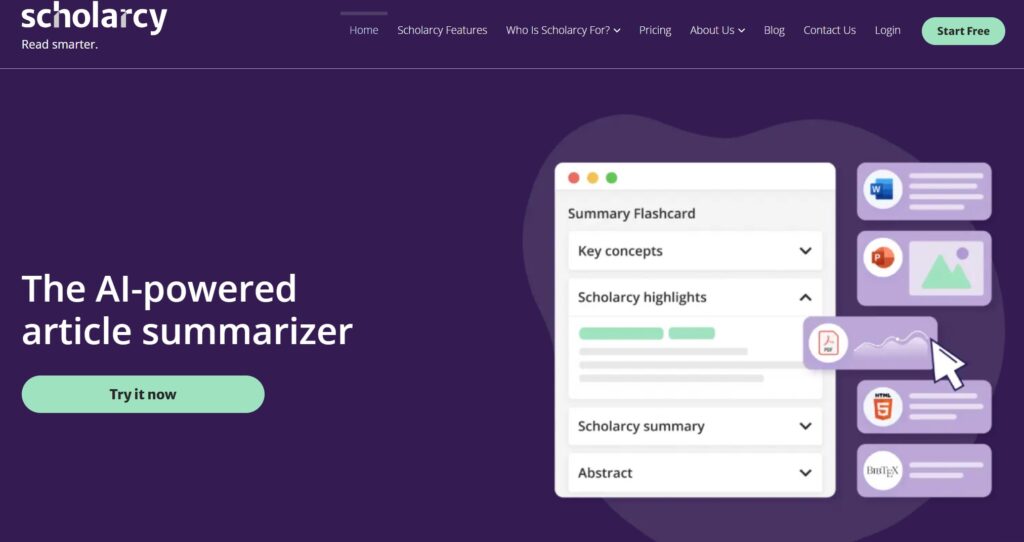
This tool generates a Word or PDF document summary, complete with links to open-access versions of referenced sources. Additionally, it can be configured to extract figures, tables, and images from articles, presenting information in a more easily digestible format.
💻 Key Features:
- Automatic extraction of references.
- Figures, tables, and image extraction.
- A searchable database of summary cards.
- Chrome and Edge extensions are connected to open-access repositories.
👍 Pros:
- Typically undergoes expert evaluation before publication through a peer-review process.
- Includes footnotes or bibliographies to substantiate research and guide further exploration of a topic.
- Features authors who detail the methodology and provide data to bolster research findings.
👎 Cons:
- Contains pricey and sometimes hard-to-find scholarly periodicals
- Articles have technical language that is not easy for non-specialists to understand.
- Not useful for current events.
💰 Pricing:
- Free: Browser extension and flashcards.
- Premium plan: $9.99 per user, per month.
Semantic Scholar
While most people are familiar with Google Scholar, a tool that harnesses Google’s search capabilities to compile academic publications for scientific research, consider exploring Semantic Scholar. This AI-driven search and discovery tool made accessible through collaborations with publishers, data providers, and web crawlers empowers you to stay abreast of over 200 million academic papers.
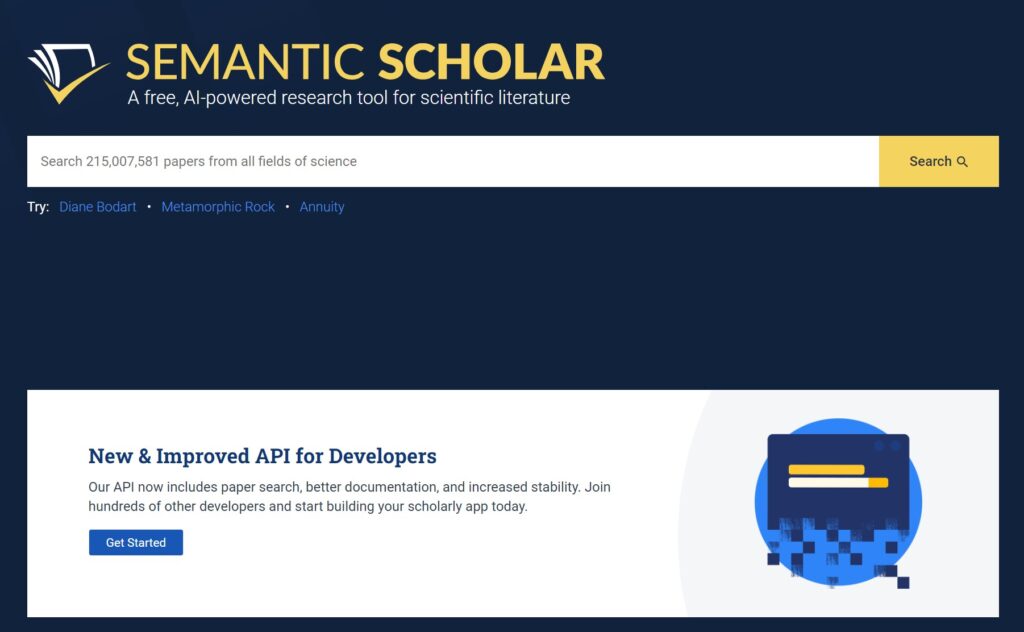
💻 Key Features:
- This application can assist researchers with tracking scientific publications, finding and navigating pertinent material, and visualizing citations.
- It is highly suggested to utilize its extensive search capabilities and citation analysis functions.
- Its AI-driven methodology makes it possible to produce and distribute excellent scientific content quickly.
👍 Pros:
- It is designed to analyze and understand scientific literature, extracting key information and insights from vast amounts of data.
- It can identify relevant papers, summarize research findings, and provide contextual recommendations.
- Semantic Scholar AI streamlines the research process and helps scholars stay up-to-date with the latest advancements in their field.
👎 Cons:
- It heavily relies on machine learning algorithms, which can sometimes lead to biased or inaccurate results.
- The AI may struggle with understanding and interpreting complex research topics, limiting its effectiveness in certain fields.
💰 Pricing:
- Starting price: Free.
- Premium plan: Customized for your needs.
ProofHub
ProofHub AI is an advanced feature that leverages artificial intelligence to enhance project management processes. This platform enhances team efficiency in managing projects and fostering collaboration. Through a centralized hub, teams can effortlessly create and share tasks, establish priorities, assign responsibilities, and track progress. Real-time feedback is facilitated, and the system allows for setting reminders to ensure timely adherence to deadlines.
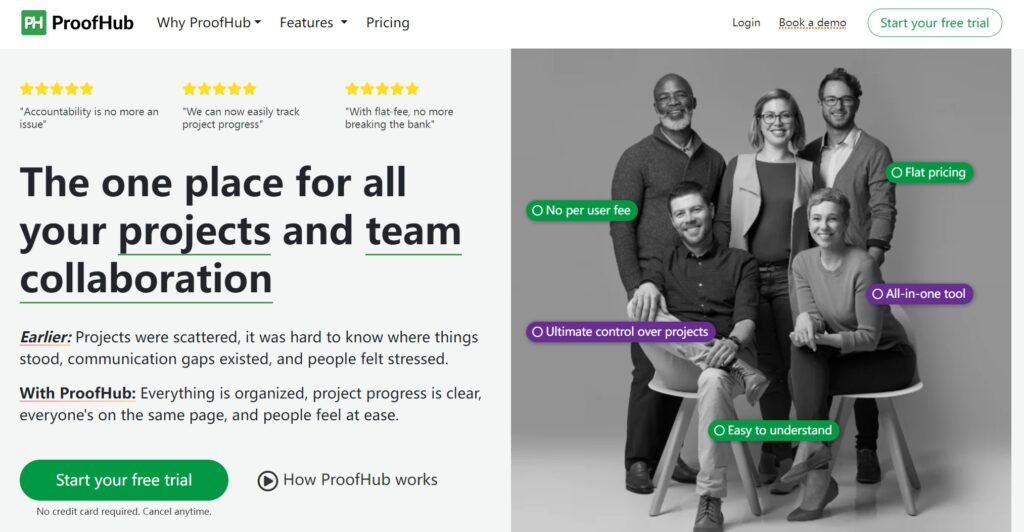
💻 Key Features:
- Time tracking and scheduling functionalities.
- Workflow automation to enhance efficiency.
- Robust security measures and access control.
- Task and project management with Kanban tools and Gantt charts.
- Centralized platform for streamlined collaboration and communication.
👍 Pros:
- Get all your projects on a single screen.
- It can automate repetitive tasks, saving time and effort for users.
- It can analyze data and provide valuable insights, helping teams make informed decisions.
👎 Cons:
- It may not be able to handle complex tasks that require human judgment and creativity.
💰 Pricing:
- Ultimate control plan: $89 per month, billed annually, or $99 per month billed monthly.
- Essential plan: $45 per month, billed annually, or $50 per month, billed monthly.
Bit.ai
Bit.ai, the ultimate team document solution, lets you create, manage, and track all your documents in one place. Unlike traditional documents, Bit’s innovative approach goes beyond text and images, allowing the integration of diverse digital content. It revolutionizes communication in document form, fostering creativity and enabling real-time collaboration for smarter content creation and insights.
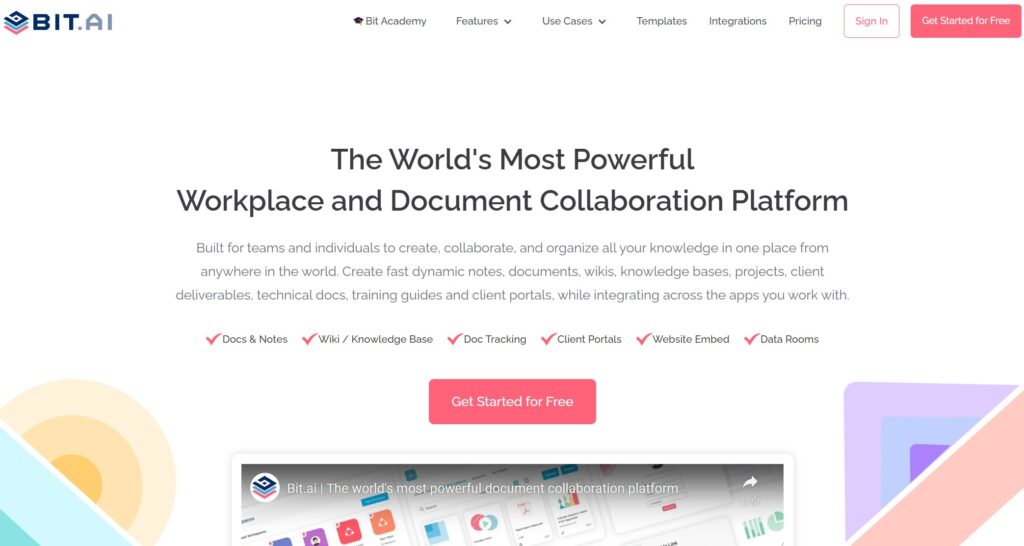
💻 Key Features:
- Real-time collaboration.
- Document tracking and analytics.
- Customizable templates.
- Integrations with popular apps like Slack and Google Drive.
- It’s a powerful tool for collaboration and document management.
👍 Pros:
- Users can easily collaborate on documents, and track changes and engagement.
- You can streamline your workflow with templates.
- Seamlessly integrate Bit.ai into existing productivity tools.
👎 Cons:
- The free version of bit.ai has limited storage space, which may not be sufficient for users with large amounts of data.
- Additionally, some users have reported occasional glitches or slow loading times when working with larger documents.
💰 Pricing:
- Free plan: Free.
- Pro plan: $8 per member, per month.
- Business plan: $15 per member, per month.
>> Don’t Miss:
- 6 Best AI Tools for Digital Marketing to Optimize Your Strategy
- 7 Best AI Tools for Music Production (2024)
- 8 Best AI Tools for Job Seekers to Land a Job (2024)
How to Choose the Best Research AI Tools? 💡
Let’s embark down to how to choose the best AI tools for your research project.
- Define Your Research Goals: Clearly define your research objectives and the tasks you need the AI tool to perform. Different tools specialize in various areas such as natural language processing, computer vision, and predictive analytics.
- Understand Your Data: Consider the type and format of your data. Some AI tools are designed for structured data, while others excel with unstructured data such as text or images.
- Evaluate Model Performance: Look for tools with proven track records in terms of model performance. Check if the tool has been used successfully in similar research domains or tasks.
- Consider Usability: Evaluate the tool’s user interface and ease of use. A tool that is user-friendly and has good documentation can save time and resources during the research process.
- Integration with Existing Tools: This is an important aspect that aids a smooth research experience. Check whether the AI tool can seamlessly integrate with your existing research workflow and tools.
>> Don’t Miss: 9 Best Content AI Tools for Writing (2024)
Frequently Asked Questions (FAQ) 🙋♂️
What AI tools are good for research projects?
When it comes to AI research tools, there are several highly regarded options that researchers often rely on. Some of the best tools include Typeset.io and Quillbot, which are widely used for machine learning and deep learning tasks.
What are the qualities of a good AI research tool?
It’s critical to take into account a number of factors when selecting the best AI research tool for your needs, including your chosen programming language, the amount of computational power at your disposal, the tool’s level of community support, and its documentation.
Are there any trustworthy and useful free tools for AI research?
Indeed, there are a number of cost-free AI research tools that are dependable and efficient. Numerous features, including data analysis, model training, and evaluation measures, are frequently offered by these solutions. Furthermore, the AI community’s researchers and developers regularly employ them.
Are there any AI research tools that offer cloud-based computing capabilities for large-scale experiments?
Regarding cloud-based computing capabilities for large-scale experiments, there are indeed AI research tools that offer such features. For example, the Google Cloud AI Platform provides a scalable infrastructure.
>> Don’t Miss: 7 Best AI Tools for Teachers to Work More Efficiently (2024)
Conclusion 📌
As a result of analyzing numerous AI research tools, it is clear that there isn’t a single tool that works for all researchers. The project’s goals and particular requirements will determine which AI research instruments are most appropriate. Therefore, before choosing the best tool for their AI research projects, researchers must carefully evaluate their objectives and take into account elements like compatibility, scalability, and ease of use.
>> Check more recommendations on the best AI tools.




